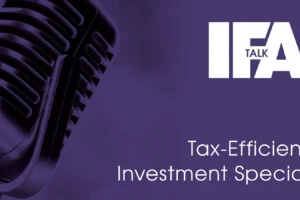Whilst on the surface, the fact that today’s announcement by the ONS shows that inflation for May remained at 8.7% might not cause alarm. But, and it’s a big but, dig a bit deeper and the shock news that core inflation has increased, means that the worse than expected data has worried investors, businesses and consumers alike – and for good reason too.
To find out more about the detail and what the latest inflation data means, check out all the commentary below. We’ve compiled notes from various finance experts across a range of different sectors, who’ve been sharing their views – and concerns- with IFA Magazine this morning as follows:
Jonny Black, Chief Commercial and Strategy Officer at abrdn, Adviser, said:
“While inflation’s not risen, it’s not heading in the direction that the Bank of England wants to it to go. Given that we’re likely to see CPI end the year at a higher level than previously expected, advisers should be sitting down with clients to explain how their long-term plans account for this scenario and to discuss any further adjustments they need to make. At a time when it seems like forecasts are revised by the hour, and as banks are pulling and re-issuing mortgage products to adapt to a rapidly changing landscape, this will all be about supporting a cool, calm and rational approach to planning.
“Last week’s wage data showed that the UK labour market is still very tight. This, together with today’s inflation print, makes it highly likely that the Bank will raise interest rates further tomorrow. This will be another flashpoint for client concern. Advisers may want to be preparing to proactively engage with them now. Even a quick message, delivering re-assurance and insight, will go a long way.”
Rob Clarry, Investment Strategist at wealth manager Evelyn Partners, said:
“It’s ‘another month, another poor inflation print for the Bank of England to deal with. The Bank’s monetary policy committee faces an unenviable task: bringing CPI back towards the 2% target without tipping the economy into a recession. Too much tightening too soon could trigger a downturn; too little could enable second-round effects to take hold, where higher input costs are reflected in higher wages, otherwise known as a wage-price spiral.
“Today’s inflation report did absolutely nothing to ease the MPC’s dilemma. Headline inflation surprised to the upside and remains sticky at a very elevated level. Rising prices for air travel, recreational and cultural goods and services, and second-hand cars resulted in the largest upward contributions to the monthly change in the CPI annual rate. Falling prices for motor fuel led to the largest downward contribution to the monthly change in the CPI annual rate. While prices for food and non-alcoholic beverages rose in May 2023 but by less than in May 2022.
“Even more concerning is that core inflation – a better gauge of underlying inflation pressures – hit its highest rate since March 1992. The odds on a 50bps move from the MPC tomorrow have shortened. However, we do expect UK CPI to fall in the second half of 2023. One reason is the effect of lower energy prices will start to feed through. For example, Ofgem announced that the price cap would decrease from £3,280 to £2,074 from 1 July 2023; a further decrease can be expected at the August price review. Moreover, services inflation lags producer services output price inflation, which has been decelerating since the end of last year. Food inflation should also continue to ease.
“Despite the apparent risks of a wage-price spiral in the UK economy, history appears to be on its side. A recent paper by the IMF finds that: “Of the 79 episodes identified with accelerating prices and wages going back to the 1960s, only a minority of them saw further acceleration after eight quarters… an acceleration of nominal wages should not necessarily be seen as sign that a wage-price spiral is taking hold. Indeed, history suggests that nominal wages can accelerate while inflation recedes from high levels.
“This empirical evidence is unlikely to be of comfort to the MPC though, as they meet today and tomorrow to discuss interest rate policy. With still see a 25 bps hike as more likely, although 50 bps is on the table given today’s data. Their messaging will continue to be hawkish. Traders now expect UK interest rates to peak around 6%, significantly higher than a month or so ago, but still slightly below the market expectation seen in the aftermath of the Truss/Kwarteng mini budget in September last year.”
Alexandra Loydon, Director Partner Engagement and Consultancy at St. James’s Place said:
“Whilst the UK headline inflation rate remains in single digits at 8.7%%, it hasn’t fallen in May and will be small comfort to hard-pressed consumers when the CPI has risen to 7.1%. In all likelihood this could have a significant impact on the Bank of England’s interest rate decision tomorrow.”
“Inflation is putting an increasing strain on families and businesses, but there is no doubt that the Bank of England will continue to keep the option of interest rate rises firmly on the table. Ahead of tomorrow’s decision, there is little scope for easing the pressure on borrowers and it is particularly stark for those on variable rate mortgages. As for investors, they will need to continue to diversify their portfolios to ensure they are as inflation-proofed as they can be and can reduce risk when markets are volatile.”
Chieu Cao, CEO of Mintago, said:
“Today’s data indicates that inflation is not falling as quickly as we would have hoped. The cost-of-living crisis in the UK rages on, which will also mean higher interest rates to come, placing even greater pressure on people’s finances.
“Behind the data is a very real, very human issue. People are struggling to make ends meet, and we cannot underestimate the impact inflation continues to have on people’s financial and mental wellbeing. We have to provide more support, and it is not just for the government to deliver this. Employers must also intervene and take action to protect their employees from financial devastation through targeted, impactful wellbeing support.
“Businesses will have their own financial challenges. But it is vital employers remember that a lack of financial support will lead to stressed, discontented employees. And frankly, that is akin to taking a wrecking ball to employee satisfaction, job performance and ultimately a business’s success.”
—
Mohsin Rashid, CEO of ZIPZERO, said:
“With grocery inflation finally on a downward trend, the whole nation will breathe a collective sigh of relief – perhaps we truly are on the way back to calmer times. Supermarkets have demonstrated real character over the past few weeks by passing on cost savings. We’ve seen most chains announce price cuts to a significant batch of products that consumers will no doubt be thankful for.
“Yet the good news does not hide the fact that when it comes to food inflation we are at the top of a very big peak, and we are limping back to the bottom. Meanwhile, core inflation remains sticky, raising concerns over how entrenched it is within the UK economy. Expect higher interest rates tomorrow. And expect Britons to keep the purse strings tight for still some time, with a savvy marshalling of financial resources and an emphasis on money-saving techniques like loyalty and reward schemes to remain of utmost importance.”
Becky O’Connor, Director of Public Affairs of PensionBee, said:
“High inflation is the new normal. With interest rates expected to rise again tomorrow, the hope is that inflation responds and falls, soon. In the meantime, people continue to cope, trimming costs where they can, budgeting and prioritising.
“For older people, it remains difficult to plan retirement, as inflation erodes the value of pension pots. Older borrowers who are hoping to pay off their mortgages face an uphill struggle to do so, with higher repayments creating a challenge for some. For workers who are saving into their pensions, it’s important to keep at it. Stopping contributions to cope with ‘the now’ only stores up problems for the future.”
Simeon Willis, Chief Investment Officer, XPS Pensions Group, said:
“Inflation at current levels can be very damaging to pensioner incomes in particular. Even where benefits are linked to inflation, annual inflation increases are often capped, for instance to 2.5%. This means that whilst inflation remains at this level, the real value of a pensioner’s pension is being substantially eroded.
“The general inflationary environment has been less of an issue for pension schemes and employers. Long term inflation expectations, which more heavily influence liability values, have been relatively stable. Furthermore, for pension schemes with high levels of hedging, capped benefit increases can lead assets to outperform, as inflation hedging assets are usually uncapped.”
Andrew Tully, technical director, Canada Life, said:
“Despite inflation remaining flat, many people won’t be feeling the benefits, especially as wages continue to lag behind inflation, while we have higher mortgage and rent costs looming.
“The Bank of England is poised to raise interest rates by 25bps tomorrow in a further attempt to cool inflation. This will only serve to heap misery on the many households on variable rates or those whose fixed-term mortgages are coming to an end this year.
“There are no easy fixes, and policymakers and economists will be keeping a close eye on the data points to see if inflation is becoming baked into the economy.”
Peder Beck-Friis, Economist at PIMCO said:
“At the last meeting, the Band of England (BoE) hiked by +25bps to 4.5% and kept it conditional guidance unchanged, indicating that more tightening would be needed if there were to be evidence of more persistent inflationary pressures. Since then, inflation has surprised meaningfully to the upside in two consecutive releases.
“There are reasons to think some of the recent inflation surprises have been driven by one-offs, such as the start of the new taxation year in April leading to a sharp increase in prices of products linked to RPI; and the May surprise being in part driven by the timing of Easter. There may also be some impact on air fares during the Coronation period and additional bank holiday. That said, core inflation is increasing, not decreasing.
“This will add pressure on the BoE to continue tightening in coming meetings. With core inflation and wage growth both close to ~7% (YoY), and the policy rate closer to 5%, the BoE has likely more work to do. We still expect a +25bp hike tomorrow, but today’s release certainly increases the chances the BoE goes by +50bps.”














